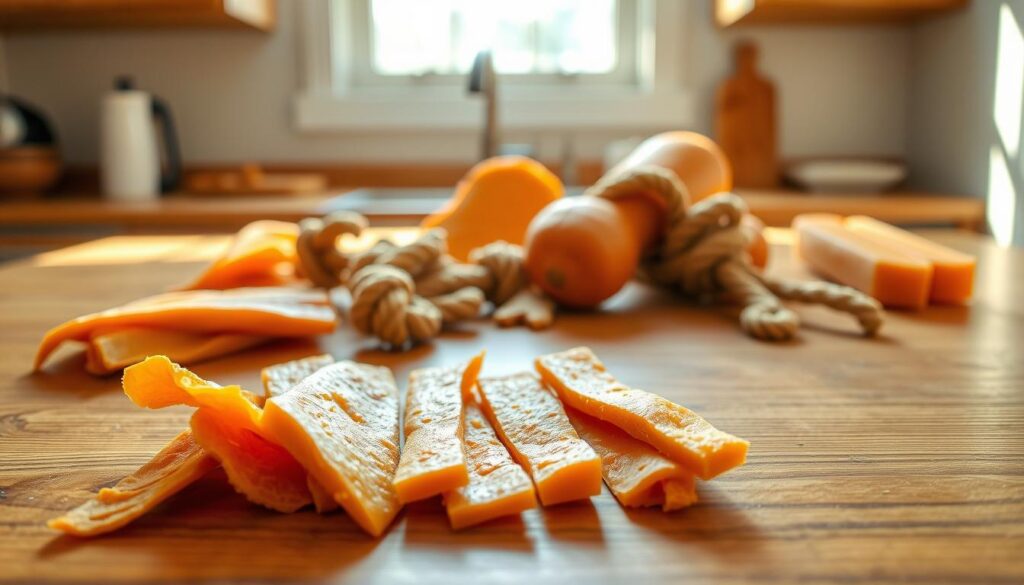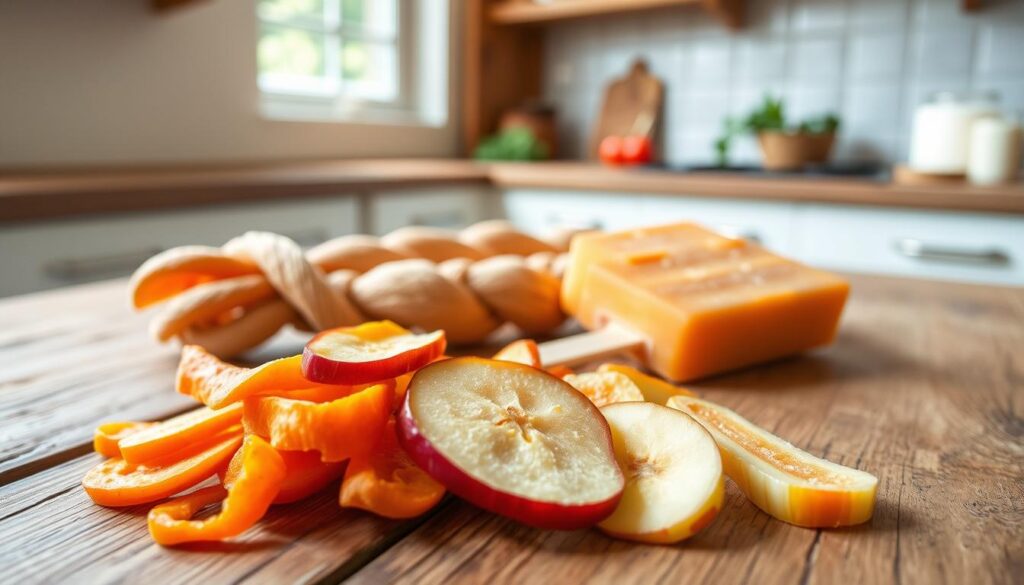Giving your furry friend the best is a top priority. But, store-bought dog chews can be pricey and filled with unwanted additives. Many pet parents are now turning to homemade dog chews as a healthier, more affordable alternative.
Making your own dog chews at home lets you control the ingredients. This ensures your pet gets the best treats without the hidden costs. In this article, we’ll explore the benefits of easy diy dog chews. We’ll also provide you with 5 simple recipes to get started.
Key Takeaways
- Healthy alternatives to store-bought dog chews
- Simple, natural ingredients for homemade treats
- 5 beginner-friendly recipes to try at home
- Benefits of controlling the ingredients in your dog’s chews
- Tips for making dog chews safely and effectively
Why Make Your Own Dog Chews at Home
Making your own dog chews at home lets you pick the ingredients. This means your dog avoids harmful additives and preservatives found in many store-bought treats.
Choosing the ingredients yourself means you can make chews that fit your dog’s diet and taste. You can avoid allergens and use ingredients that are good for their health.
Benefits of Homemade vs. Store-Bought Treats
Homemade dog chews have many advantages over store-bought ones. One big plus is controlling the quality of the ingredients. Many commercial treats have preservatives and additives that can harm your dog. Homemade chews, made with fresh, wholesome ingredients, are less likely to cause problems.
Key benefits include:
- Control over ingredients
- Avoidance of preservatives and additives
- Customization to your dog’s needs
Cost Savings and Health Advantages
Making your own dog chews can also save money. Buying ingredients in bulk and making big batches can cut costs. Plus, homemade chews can be healthier for your dog. You can pick ingredients that are good for their health.
| Aspect | Homemade Dog Chews | Store-Bought Dog Chews |
|---|---|---|
| Ingredient Control | Complete control | Limited control |
| Preservatives/Additives | Avoidable | Often present |
| Cost | Can be cost-effective | Variable costs |
By making your own dog chews, you ensure your dog gets healthy treats. You might also save money. This way, you can focus on your dog’s health without breaking the bank.
Essential Tools and Ingredients for DIY Dog Chews
Making easy homemade dog chews starts with the right tools and ingredients. The right equipment makes the process smoother. It also ensures your dog’s treats are healthy and safe.
Basic Kitchen Equipment You’ll Need
To begin making dog chews, you need basic kitchen tools. These include:
- Baking Sheets: For drying or baking treats.
- Mixing Bowls: For combining ingredients.
- Measuring Cups and Spoons: To accurately measure ingredients.
- A Blender or Food Processor: For pureeing ingredients like pumpkin or sweet potatoes.
Recommended Ingredients and Alternatives
The ingredients you pick depend on your dog’s tastes and needs. Some top picks for DIY dog chews are:
- Peanut Butter: A favorite among dogs, rich in protein.
- Pumpkin: Good for digestion, can be used canned or fresh.
- Sweet Potatoes: Rich in vitamins and minerals, great for baking.
- Carrots: Good for dental health, can be used raw or cooked.
Specialty Tools That Make Treat-Making Easier
While not essential, specialty tools can enhance the treat-making experience. Consider using:
- Cookie Cutters: To create fun shapes.
- Silicone Molds: For making uniform treats.
- A Dehydrator: For drying fruits, meats, and vegetables.
With these essential tools and ingredients, you’re ready to make a variety of healthy and tasty DIY dog chews. Your furry friend will surely enjoy them.
Safety First: Ingredients to Avoid in Homemade Dog Chews
When making homemade dog chews, your dog’s safety is key. Some ingredients can be toxic or harmful. It’s important to know which ones to avoid.
Toxic Foods and Additives for Dogs
Some foods safe for humans are toxic to dogs. For instance, chocolate, grapes, and onions are harmful. Chocolate has theobromine, which can upset a dog’s stomach and increase heart rate.
Grapes and raisins can cause kidney failure in dogs. Onions and garlic, part of the Allium family, can lead to anemia.
When making dog chew recipe ideas, avoid these ingredients. Check the ingredient list of items like peanut butter or broth. Some brands use xylitol, a sugar substitute harmful to dogs.
Choking Hazards and Texture Considerations
Texture and size of dog chews can also be risky. Choking hazards are a big concern, especially for small dogs. Make sure the chews are the right size for your dog.
- Cut chews into small, manageable pieces to prevent choking.
- Avoid using small bones or hard objects that can splinter.
- Supervise your dog during treat time to ensure their safety.
By considering these factors, you can make healthy and safe dog chew recipes. Always research and double-check the safety of any new ingredient before using it in homemade dog chews.
Easy DIY Dog Chews: 5 Homemade Recipes
Let’s explore our top 5 easy DIY dog chews recipes. Your furry friend will surely enjoy them. Making treats at home means your pet gets healthy, natural ingredients without harmful additives.
What Makes a Good Homemade Dog Chew
A good homemade dog chew should use healthy, natural ingredients. It should also match your dog’s preferences. Think about your dog’s dietary needs, allergies, and likes when picking ingredients. For example, if your dog has a sensitive stomach, avoid beef or dairy.
- Use wholesome ingredients that are safe for consumption.
- Avoid additives and preservatives found in commercial dog treats.
- Customize the recipe based on your dog’s age, size, and health conditions.
How to Customize Recipes for Your Dog’s Preferences
Customizing recipes is easy. First, figure out your dog’s favorite flavors and textures. Then, adjust the ingredients. For example, if your dog loves peanut butter, add it to the recipe. You can also change the ingredients to keep things interesting.
Some ideas for customization include:
- Adding different fruits or vegetables for varied flavors.
- Using different types of protein sources, like chicken or salmon.
- Changing the texture by baking or freezing the treats.
By following these tips, you can create DIY dog treats that your pet will love.
Recipe #1: Sweet Potato Chew Sticks
Making dog treats at home is fun and rewarding. Sweet Potato Chew Sticks are a great example. They’re tasty and full of nutrients, good for your dog.
Ingredients and Nutritional Benefits
To make Sweet Potato Chew Sticks, you need sweet potatoes, coconut oil, and honey. Sweet potatoes are full of fiber, vitamins A and C, and minerals like manganese. They’re great for a healthy treat.
Coconut oil adds medium-chain triglycerides (MCTs) for skin and coat health. Honey adds sweetness without refined sugars.
Together, these ingredients make a treat that’s good for your dog’s digestion. They provide essential vitamins and minerals and are easy on your dog’s stomach.
Step-by-Step Preparation Instructions
To make Sweet Potato Chew Sticks, follow these steps:
- Preheat your oven to 400°F (200°C).
- Wash and peel 2-3 large sweet potatoes, then slice them into thin strips, about 1/4 inch thick.
- In a bowl, mix 1 tablespoon of coconut oil with 1 teaspoon of honey until well combined.
- Toss the sweet potato strips in the coconut oil and honey mixture until they are evenly coated.
- Line a baking sheet with parchment paper and arrange the sweet potato strips in a single layer.
- Bake for 20-25 minutes or until the strips are dry and slightly flexible.
- Remove from the oven and let cool completely before serving to your dog.
Storage Tips and Shelf Life
To keep your Sweet Potato Chew Sticks fresh, store them in an airtight container at room temperature for up to a week. For longer storage, freeze them for up to 3 months. Thaw at room temperature or refrigerate overnight before serving.
By making your own homemade pet treats, you can give your dog healthy snacks. Sweet Potato Chew Sticks are a simple and healthy DIY pet treat.
Recipe #2: Chicken and Pumpkin Jerky Strips

Chicken and Pumpkin Jerky Strips are a great homemade treat for dogs. They’re full of nutrients and taste good. This recipe uses chicken breast for protein and pumpkin for digestion, making it a healthy snack.
Ingredients and Nutritional Benefits
To make Chicken and Pumpkin Jerky Strips, you need:
- 1 pound boneless, skinless chicken breast
- 1/2 cup pumpkin puree
- 1 tablespoon honey
- 1 teaspoon dried parsley
Chicken breast is rich in protein, which is good for dogs’ muscles and energy. Pumpkin helps with digestion and can ease stomach problems. Honey adds sweetness, and parsley adds flavor and extra nutrients.
| Ingredient | Nutritional Benefit |
|---|---|
| Chicken Breast | High-quality protein for muscle health |
| Pumpkin Puree | Aids digestion and relieves gastrointestinal issues |
| Honey | Natural sweetener with antimicrobial properties |
| Dried Parsley | Fresh flavor and additional nutrients |
Step-by-Step Preparation Instructions
Here’s how to make Chicken and Pumpkin Jerky Strips:
- Preheat your oven to 160°F (or the lowest temperature setting).
- In a blender or food processor, mix chicken breast, pumpkin puree, honey, and parsley until smooth.
- Pour the mix onto a baking sheet lined with parchment paper, spreading it thin.
- Dehydrate in the oven for 3-4 hours, until it’s like jerky.
- Let it cool completely before cutting into strips.
Storage Tips and Shelf Life
Keep Chicken and Pumpkin Jerky Strips in an airtight container in the fridge. They stay fresh for up to two weeks. You can also freeze them for up to three months.
Making your own homemade dog treats, like Chicken and Pumpkin Jerky Strips, is a great way to give your dog healthy snacks. This DIY dog treat recipe is fun to make and gives your dog a nutritious reward.
Recipe #3: Peanut Butter and Banana Frozen Chews
Peanut Butter and Banana Frozen Chews are a great summer snack for dogs. They are delicious and healthy, helping to keep your dog cool. These treats are also packed with nutrients.
Ingredients and Nutritional Benefits
This recipe needs simple, nutritious ingredients. You’ll need:
- 2 ripe bananas
- 1/4 cup creamy peanut butter
- 1 tablespoon honey (optional)
- 1/4 cup plain yogurt (optional)
Bananas are full of potassium, vitamins, and fiber, making them good for dogs. Peanut butter is high in protein and healthy fats, but pick a brand without xylitol. Honey and yogurt add sweetness and creaminess, but are optional.
| Ingredient | Nutritional Benefit |
|---|---|
| Bananas | Rich in potassium, vitamins, and fiber |
| Peanut Butter | High in protein and healthy fats |
| Honey | Natural sweetener with antibacterial properties |
| Yogurt | Provides probiotics for digestive health |
Step-by-Step Preparation Instructions
To make Peanut Butter and Banana Frozen Chews, follow these steps:
- Mash the ripe bananas in a bowl until they are smooth.
- Mix in the peanut butter until well combined.
- If using, add the honey and yogurt, and mix until the mixture is smooth and creamy.
- Spoon the mixture into ice cube trays or silicone molds.
- Freeze the mixture for at least 3 hours or until solid.
- Once frozen, pop out the chews and store them in an airtight container in the freezer.
Storage Tips and Shelf Life
These frozen chews can be stored in the freezer for up to 3 months. Always check the treats for any signs of spoilage before giving them to your dog. The frozen texture helps preserve the ingredients, but it’s essential to monitor their condition, especially if you add ingredients like yogurt that can affect their shelf life.
By making your own pet-friendly chews at home, you can ensure that your dog enjoys healthy, natural treats without the additives found in some commercial products. Enjoy making and sharing these natural dog treats with your furry friend!
Recipe #4: Carrot and Apple Dental Chews

Try our Carrot and Apple Dental Chews recipe for your dog’s oral health. These chews are tasty and help reduce plaque and tartar. They promote healthier gums, too.
Ingredients and Nutritional Benefits
The Carrot and Apple Dental Chews use simple, nutritious ingredients. Carrots are full of fiber and vitamins. Apples add natural sweetness and antioxidants. They make a tasty, healthy snack.
| Ingredient | Nutritional Benefit |
|---|---|
| Carrots | High in fiber and vitamins |
| Apples | Rich in antioxidants |
| Oat Flour | Provides a crunchy texture |
Step-by-Step Preparation Instructions
Making these chews is simple. Start by preheating your oven to 350°F (175°C). Mix 1 cup of grated carrots, 1/2 cup of apple puree, and 1 cup of oat flour. Roll it out to 1/4 inch thickness.
Use a cookie cutter for fun shapes. Bake for 20-25 minutes until firm and lightly browned.
Let the chews cool before giving them to your dog. Store them in an airtight container.
Storage Tips and Shelf Life
Keep the chews fresh in an airtight container in the fridge. They last up to 2 weeks. You can freeze them for up to 2 months.
Recipe #5: Beef Bone Broth Biscuit Chews
Our fifth recipe, Beef Bone Broth Biscuit Chews, combines beef bone broth with whole wheat flour. This DIY dog chew idea is tasty and full of nutrients. It’s great for your dog’s health.
Ingredients and Nutritional Benefits
To make Beef Bone Broth Biscuit Chews, you need:
- 1 cup beef bone broth
- 2 cups whole wheat flour
- 1/4 cup rolled oats
- 1/4 cup finely chopped parsley
Beef bone broth is full of protein and minerals. It’s perfect for dog treats. Whole wheat flour adds fiber, and rolled oats give a nice texture. Parsley adds a fresh flavor and health benefits.
Step-by-Step Preparation Instructions
Here’s how to make Beef Bone Broth Biscuit Chews:
- Preheat your oven to 350°F (175°C). Line a baking sheet with parchment paper.
- In a large bowl, mix the whole wheat flour and rolled oats.
- Add the beef bone broth slowly, stirring until a dough forms.
- Roll out the dough to 1/4 inch thickness. Use a cookie cutter or a glass to cut shapes.
- Place the shapes on the prepared baking sheet.
- Bake for 20-25 minutes, or until the edges are lightly browned.
- Let the biscuits cool completely on the baking sheet before storing them in an airtight container.
Dog nutrition experts say, “Homemade dog treats are a healthier choice than store-bought ones. They let you control the ingredients and avoid preservatives.”
Storage Tips and Shelf Life
Keep the Beef Bone Broth Biscuit Chews in an airtight container at room temperature for up to a week. For longer storage, freeze them for up to 3 months. Thaw at room temperature or refrigerate overnight before serving.
Making your own dog chews, like these Beef Bone Broth Biscuit Chews, is a healthy snack for your dog. It’s also a fun DIY dog chew idea that you can customize for your dog’s taste.
Conclusion
Making easy DIY dog chews at home is a fun and rewarding task. It lets you give your furry friend healthy, natural treats. By following the 5 homemade dog chews recipes in this article, you can make a variety of tasty and safe snacks for your dog.
With a bit of creativity and trying out different things, you can make dog chews that your dog will love. You can use sweet potatoes, chicken, or peanut butter. Making your own dog chews at home means you can choose the ingredients. This way, you can make sure your dog gets the best treats.
Adding easy DIY dog chews to your pet care routine can help your dog’s health and happiness. So, why not start today? See how much joy homemade dog chews can bring to your furry friend?

